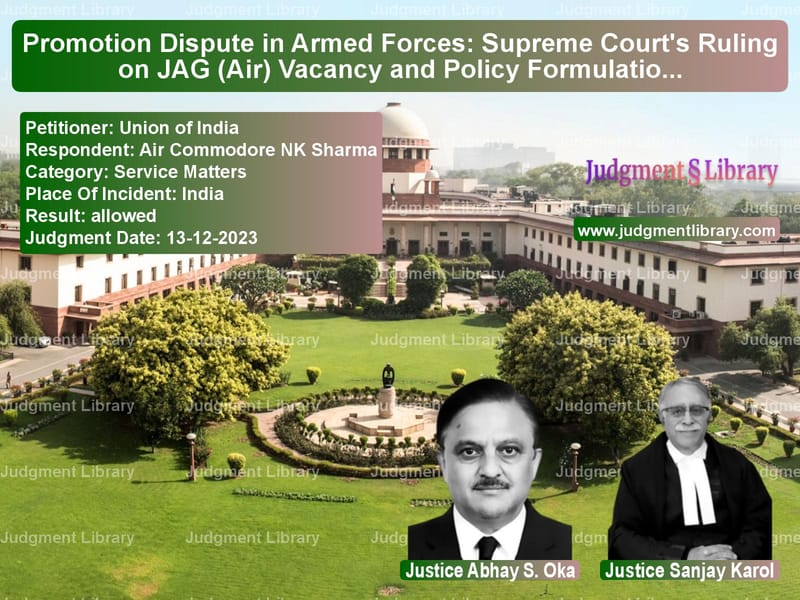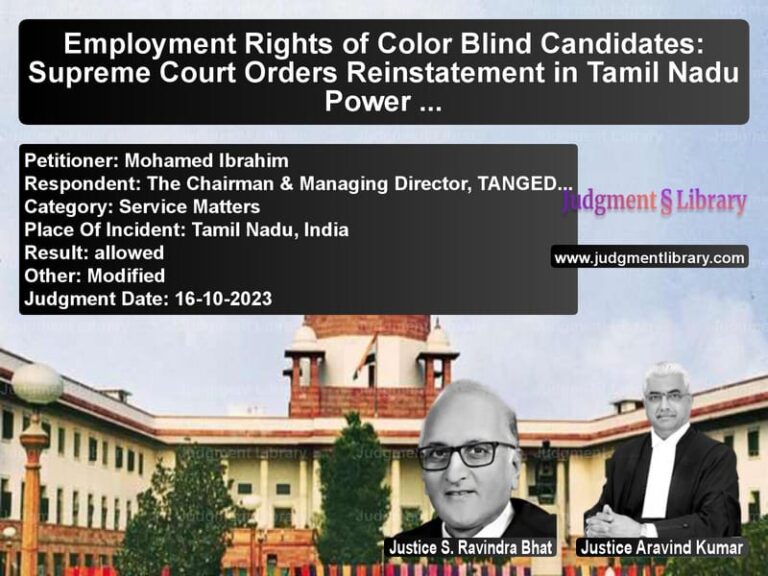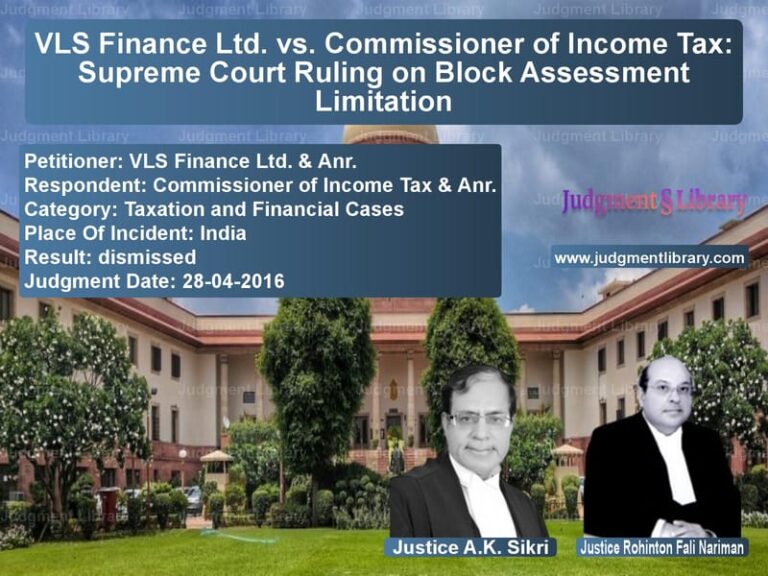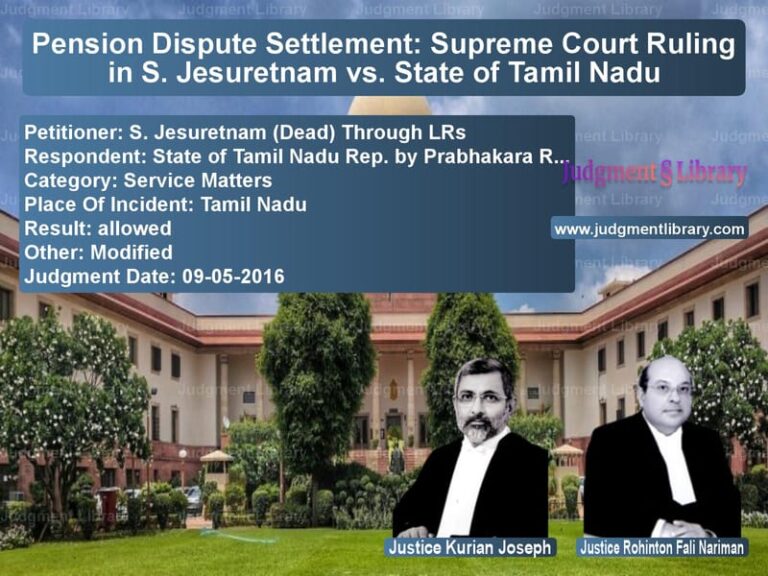Promotion Dispute in Armed Forces: Supreme Court’s Ruling on JAG (Air) Vacancy and Policy Formulation
The case at hand involves Air Commodore NK Sharma and the Union of India, addressing an issue of promotion within the Indian Air Force. The dispute centers on the promotion to the rank of Air Vice Marshal (AVM) for the position of Judge Advocate General (JAG) (Air), a position that was upgraded following certain recommendations. The respondent, Air Commodore Sharma, who met all the criteria for promotion, was not considered for the promotion and contested the denial. The core issue involved a failure to form a promotion board for the JAG (Air) position and the absence of a policy for filling such vacancies after the position was upgraded.
The respondent, despite meeting the qualifications for promotion, was denied the post of AVM (JAG Air) even when it became vacant. The appellant, Union of India, rejected the recommendations made by the promotion board. This led the respondent to approach the Armed Forces Tribunal (AFT) challenging the denial of his promotion. The Tribunal ruled in favor of the respondent, directing the Union of India to formulate a policy for promotion to the position of AVM JAG (Air). The Union of India appealed the decision to the Supreme Court.
Petitioner’s Arguments
The petitioners, representing the Union of India, argued that the Armed Forces Tribunal overstepped its jurisdiction by directing the government to formulate a policy for the promotion to AVM (JAG Air). The main points raised were:
- Such a direction from the Tribunal was against public policy as it could lead to the respondent continuing in service beyond the normal retirement age.
- The Tribunal’s order mandating the formulation of a policy for the promotion board was not within the Tribunal’s powers, as policy formulation falls within the domain of the executive.
- The respondent had been duly considered for promotion in the Promotion Board of 2015, where he was found unfit for the AVM (JAG Air) position.
- Given that no legal provision required the formation of a separate promotion board, the Tribunal’s order was unjustified.
Respondent’s Arguments
The respondent, Air Commodore NK Sharma, defended his position by making the following arguments:
- The denial of promotion despite meeting all the legal qualifications for the position violated his fundamental rights, particularly the right to equality and the right to be considered for promotion in a fair and just manner.
- He contended that the delay in forming a policy for the promotion to the upgraded post of AVM was a direct violation of the existing norms and orders, which required prompt action to fill vacancies.
- The absence of a policy for legal personnel’s promotion created a discriminatory environment and a lack of transparency.
- The direction to continue functioning as JAG (Air) until the policy was formulated was justified, as the delay in policy formation was caused by the Union of India.
Supreme Court’s Ruling
The Supreme Court in this case thoroughly examined the facts, legal framework, and the powers of the Armed Forces Tribunal. The Court ruled:
- The Armed Forces Tribunal did not have the jurisdiction to direct the Union of India to formulate a policy for the promotion to AVM JAG (Air). The formulation of a policy is within the purview of the government and not the judiciary or quasi-judicial bodies like the Tribunal.
- Judicial bodies, including the Tribunal, do not have the authority to dictate how promotions are to be made or how the government should form policies for the armed forces.
- The Tribunal erred in granting relief beyond its jurisdiction by extending the respondent’s service beyond the retirement age.
- The direction for the respondent to continue as JAG (Air) until a policy was formulated was not valid, as the government had the right to determine promotion procedures in accordance with the prevailing rules.
Conclusion
The Supreme Court concluded that while the promotion process within the armed forces is undoubtedly a matter of great importance, the decision regarding policy formation and the right to promotion lies solely within the government’s domain. The Tribunal, though empowered to resolve disputes, cannot dictate the policy for promotions or extend an officer’s service beyond the statutory retirement age. This judgment emphasizes the separation of powers between the judiciary and the executive, particularly when it comes to policy formulation in matters concerning the armed forces.
Petitioner Name: Union of India.Respondent Name: Air Commodore NK Sharma.Judgment By: Justice Abhay S. Oka, Justice Sanjay Karol.Place Of Incident: India.Judgment Date: 13-12-2023.
Don’t miss out on the full details! Download the complete judgment in PDF format below and gain valuable insights instantly!
Download Judgment: union-of-india-vs-air-commodore-nk-sha-supreme-court-of-india-judgment-dated-13-12-2023.pdf
Directly Download Judgment: Directly download this Judgment
See all petitions in Promotion Cases
See all petitions in Public Sector Employees
See all petitions in Recruitment Policies
See all petitions in Disciplinary Proceedings
See all petitions in Termination Cases
See all petitions in Judgment by Abhay S. Oka
See all petitions in Judgment by Sanjay Karol
See all petitions in allowed
See all petitions in supreme court of India judgments December 2023
See all petitions in 2023 judgments
See all posts in Service Matters Category
See all allowed petitions in Service Matters Category
See all Dismissed petitions in Service Matters Category
See all partially allowed petitions in Service Matters Category







